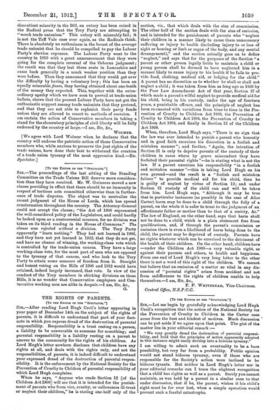THE RIGHTS OF PARENTS.
[To TEE EDITOR OP THE "SPECTLTOIL."] Sin,—After reading Lord Hugh Cecil's letter appearing in your paper of December 14th on the subject of the rights of parents, it is difficult to understand that part of your foot- note in which you express dread of the destruction of parental responsibility. Responsibility is a trust resting on a person, a liability to be answerable to someone for something; and parental responsibility is a liability resting on a parent to answer to the community for the rights of his children. As Lord Hugh's letter nowhere discloses that children have any rights at all, and deals with the rights only, and not the responsibilities, of parents, it is indeed difficult to understand your expressed dread of the destruction of parental respon- sibility. It is the enforcement by the National Society for the Prevention of Cruelty to Children of parental responsibility of which Lord Hugh complains.
When he says, " Anyone who reads Section 12 [of the Children Act 1908] will see that it is intended for the punish- ment of parents who from vice, cruelty, or callousness ill-treat of neglect their children," he is stating one-half only of the section, viz., that which deals with the sins of commission. The other half of the section deals with the sins of omission, and is intended for the punishment of parents who "neglect their children in a manner likely to cause them unnecessary suffering or injury to health (including injury to or loss of sight or hearing or limb or organ of the body, and any mental
derangement)," and the section actually goes on to define "neglect," and says that for the purposes of the Section "a
parent or other person legally liable to maintain a child or
young person shall be deemed to have neglected him in a manner likely to cause injury to his health if he fails to pro-
vide food, clothing, medical aid, or lodging for the child." A parent has no discretion as to whether he shall or shall not neglect a child ; it was taken from him as long ago as 1868 by the Poor Law Amendment Act of that year, Section 37 of which made a parent's wilful neglect to provide medical aid for his child, being in his custody, under the age of fourteen years, a punishable offence, and the principle of neglect has been re-enacted with variations from time to time in the Pre- vention of Cruelty to Children Act 1889, the Prevention of Cruelty to Children Act 1894, the Prevention of Cruelty to Children Act 1904, and finally in Section 12 of the Children Act 1908.
When, therefore, Lord Hugh says, "There is no sign that the law was ever intended to punish a parent who honestly and in good faith exercises his discretion in a foolish and mistaken manner "; and further, "Again, the intention of Section 21 is only to deprive parents of the custody of their children in cases where by grave misconduct they have forfeited their parental rights "—he is stating what is not the law. If a parent exercises his responsibility " in a foolish and mistaken manner "—this is taking Lord Hugh on his own ground—and the result is a " foolish and mistaken failure" to provide medical aid for his child, then he is guilty of neglect by virtue of Section 12; and under Section 21 custody of the child can and will be taken from him. Lord Hugh says, " Although it may be true that in particular instances (as possibly in the case of Alice Carter) harm may be done to a child through the folly of a parent, on the whole it is safer to trust to the judgment of an affectionate father or mother than to that of a society, &c." The law of England, on the other hand, says that harm shall not be done to a child, which is a plain statement free from qualifications, and, if through the parent's commission or omission there is even a likelihood of harm being done to the child, the parent may be deprived of custody. Parents have no rights whatever which can be exercised to the detriment of the health of their children. On the other hand, children have —under the Children Act 1908—a very valuable right, as against their parents and others, to health and happiness. From one end of Lord Hugh's very long letter to the other there is not a word of this right of the children. We cannot but believe that an omission of a matter so vital in any dis- cussion of "parental rights" arises from accident and not from indifference to the rights of children unable to help themselves.—I am, Sir, &c.,










































 Previous page
Previous page